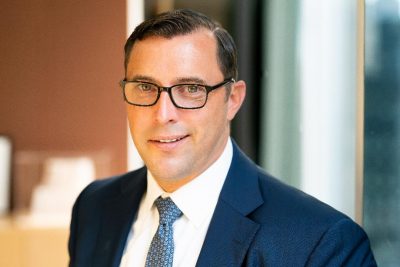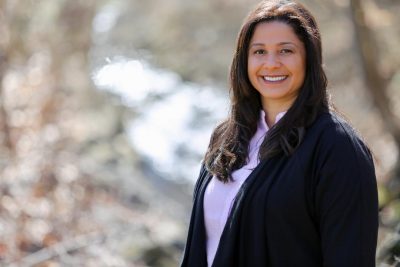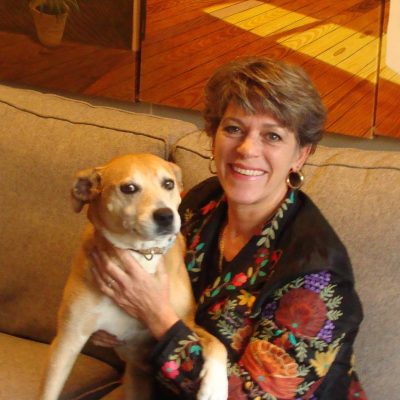Pleasantville to See Three Candidates in Contested Board of Education Race
On Tuesday, May 18, three candidates will be vying for two available seats on the Pleasantville Board of Education. One seat is held by current board Vice President Emily Rubin Persons, the other seat is being vacated by President Larry Boes, who was first elected to the Board of Education in 2012 and served as vice president in 2016 and 2017.

Michael Busch
Busch has lived in the district for 13 years and, with three children attending Pleasantville schools, he has been active in volunteering for youth programs.
“I’ve been involved in many shapes and forms in the community,” Busch said, justifying his reason for his first-time run for the board, which would add to his roles as regional commissioner of AYSO Region 199 and co-president of the Pleasantville Football Club.
His is currently general counsel and principal of The Georgetown Company, LLC, a national real estate developer and where he is the COVID compliance officer.
“I assisted the school district with some of the same ideas (used at work) and want to continue to become more involved in that especially after this last year,” Busch said.
The COVID-19 shutdown was an impossible situation for the schools, according to Busch.
“The district did a phenomenal job and navigated the pandemic in an amazing fashion, given all the conflicting guidance and rules,” he said.
An essential lesson learned from the pandemic is to strengthen communication with the community. Because his 10- and 13-year-olds are in the middle school and his eight-year-old child attends Bedford Road School, Busch said was aware of the many forums held by the district, but others did not, which could be indicative of a communications failure.
“The e-mails were too voluminous and summer communication was completely cut off, leaving many in the dark and unaware of just how hard the district was working,” Busch said.
The pandemic has demonstrated that remote learning can never equal in-person classroom instruction, but Busch said that he wouldn’t be opposed to offering online classes on a regular basis.
“We have tons of different types of learners and some kids thrived during the pandemic with online learning; some kids didn’t,” he said.
Busch said he doesn’t see any reason to eliminate snow days.
The district’s approach to diversity and racial equity is becoming part of its core philosophy.
“We’ve had a pretty robust diversity and inclusion program that’s being established in the school,” Busch said. “It will be good to hear from the curriculum coordinators and their views on the curriculum.”
Developing and training a diverse group of educators is key, and Busch said he believes the district is fully committed to hiring, developing and training a diverse group of educators.
“This goal was formalized in the second phase of the strategic plan adopted right before the pandemic hit,” he said. “I believe there will be a report on the progress made in the next few months, which I look forward to reviewing.”
Spending funds received from the state and federal governments should go toward improvements in building safety, such as upgrading the ventilation systems, Busch said. He added the district should earmark funds for learning losses caused by the pandemic.
“Funds should be directed at both social and emotional learning so we can close the knowledge gap caused by remote learning,” Busch said. “But I’m also proud of our teachers who provide our kids with new and different innovative ways of learning.”
Sara Hukkanen

Hukkanen has lived in the district for 15 years and has three children, one at Bedford Road School and two at Pleasantville Middle School. She is an educational director for iTutor.com, Inc. Her 20-year career in education includes teaching English at the middle school and high school levels.
“I am running because we need some new vision especially because of everything that surfaced during the pandemic,” Hukkanen said, noting her experience with an education tech company has enhanced her understanding of students’ needs when learning remotely. “I really want to offer my knowledge and skill set about education in and out of the classroom.”
Hukkanen is involved with the Bedford Road School PTA, the middle school’s Garden Committee, is a SEPTA cabinet member and was on the Principal Search Committee at Bedford Road School. She is a board member of Arc Stages Education Stage, a co-chair of the Education Subcommittee of the local Diversity Equity and Inclusion (DEI) Committee and a member of the Curriculum Strategy Action Team for Phase Two of Pleasantville Schools 2026.
Decisions during and following the pandemic were more reactionary she said. “They did the best they could at the time, but could have been more proactive,” Hukkanen said. “For instance, other districts purchased desk shields in September but our district purchased them in March.”
It may have been possible for more students to return to school earlier had the district started an ongoing study in September that would determine the actual rate of virus transmission and prevention, she said.
Last summer was the optimal time for teachers to learn more about teaching remotely.
“Remote teaching was thrown at the teachers at the beginning of the school year,” Hukkanen said. “The district should have purchased (remote learning) platforms, and teachers should have been paid for their time to acquire and master remote teaching.”
Hukkanen said the district didn’t have a crisis plan when schools were shut down during the pandemic.
“There is a need for more funding to have a plan which makes sure you’re not losing students or staff members,” she said. “During a crisis is not the time to be conservative with funding.”
Hukkanen is critical of how the district decides to spend money and said the process needs more community input.
“There are small groups of people making decisions for a community and community members need to be asked what their positions are on how to better serve the students,” Hukkanen said.
More programming for social and emotional learning is where some of the extra money from the state and federal government should be spent, said Hukkanen.
Gauging where students are academically post-pandemic means more frequent surveys before the beginning of next year.
“Different children learn differently and if their situations have changed since September; the district has to be able to constantly evolve,” she said. “When you’re stagnant, that’s not good.”
Remote learning has shown to have its advantages such as expanding electives. It also works for some students and can be a tool to integrate them back into the classroom. For instance, students with hearing impairments have found remote learning beneficial because they can see the teacher’s lips moving and not hidden behind masks, Hukkanen said.
She said remote learning shouldn’t replace snow days.
“Snow days are an incredible gift and a part of living in the northeast,” Hukkanen said. “If we go remote on a snow day, everyone gets burned out.”
The issue of diversifying the staff is challenging. She concedes that the district’s staff isn’t diverse but did not know how to change that.
Hukkanen praised high school Principal Joe Palumbo for reaching out to organizations such as Today’s Students, Tomorrow’s Teachers, which mentors and trains culturally diverse and economically challenged students from high school through college and places them as effective teachers.
As the co-chair of the Education Subcommittee of the local DEI Committee, Hukkanen said that Bedford Road School has two teachers who teach diversity and racial equity as part of the curriculum.
Emily Rubin Persons

Persons, who has lived in the district for 24 years, is completing her third three-year term on the Board of Education and is its current vice president. She said her experience has taught her the importance of working on behalf of all students.
“Any school district is as good as the community’s involvement and knowing that it’s all about the students,” Persons said. “We need to listen to what students want.”
She worked as an importer and wholesaler of decorative gifts and home decor for 22 years. She used her communication skills to become an ADHD life coach. Her two older sons graduated Pleasantville High School and her third son is currently a sophomore. All three are different types of learners, Persons said.
She supports funding for teacher professional development that will help students who learn differently.
“Teachers have to have the ability to recognize what else is going on with their students,” Persons said. “They need skills enabling them to go off script and be flexible, allowing for both the teacher and student to do well.”
She serves as the liaison to the Village Board, the Special Education Parent Teacher Association (SEPTA) and the Wellness and Communications committees. She was on the Communications Action Team for the district’s first Five Year Strategic Plan, Pleasantville Schools 2026 and the Leadership Action Team for Phase Two. Persons started hosting the local access cable show “Inside Pleasantville” in 2020.
She credited the district’s successful collaboration process during the pandemic.
“Our administration collaborated together and with the teachers to create the hybrid schedule since it was important that students in all grades be in school,” Persons said.
Remote learning during the pandemic indicated that e-learning could enrich the regular curriculum.
“If a student wants to take additional courses not taught at school, offering those courses online would be an interesting idea,” Persons said. “Also, having elementary students buddy-up with students in another state or another country is something that needs to be explored.”
Remote learning should not result in replacing snow days.
“What happens if the power goes out, or a tree falls near a teacher’s house and she can’t get to school, that’s a whole cohort of kids without learning that day,” she said.
Persons approves of how the district is handling diversity, equity and inclusion.
“We are already taking steps that are ahead of other school districts when it comes to equity and inclusion,” she said. “Our DEI coordinators are taking a K-12 inventory so we know where we need to go.”
Having a diverse teaching staff, however, has been difficult to achieve and she blames the state’s certification process for being difficult, complicated and expensive.
“That needs to change. It gets in the way of opening up to a wider selection of quality people,” Persons said.
Although the district is receiving state and federal funds, spending that money can be tricky. Currently, spending on supplemental tutoring and counseling staff is essential.
“Since the pandemic, we don’t know if we’ll need counseling and tutoring which can help students who have been hit by the pandemic in many different ways,” Persons said.
Persons said during the next five years there will be numerous changes in the district.
“We have used the strategic plan to move forward,” she said. “It takes sharing information, transparency and trust. That’s what makes a great district.”

Abby is a seasoned journalist who has been covering news and feature stories in the region for decades. Since The Examiner’s launch in 2007, she has reported extensively on a broad range of community issues. Read more from Abby’s editor-author bio here. Read Abbys’s archived work here: https://www.theexaminernews.com/author/ab-lub2019/
